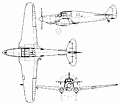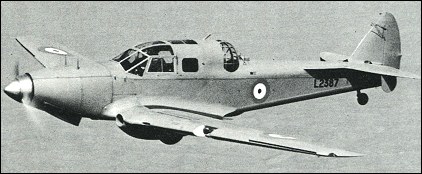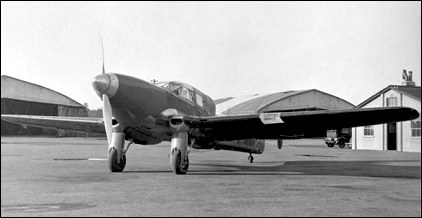|
| The de Havilland Gipsy Twelve engine installed
originally in the D.H.91 Albatross
was renamed Gipsy King for military use
and selected to power a multi-role
trainer designed to Air Ministry Specification
T.6/36. This de Havilland
D.H.93 Don was of wooden stressed-skin
construction and was intended for
use as a pilot, radio and gunnery trainer.
The prototype was flown on 18 June
1937 and following manufacturer's initial
trials, during the course of which small
auxiliary fins were fitted beneath the tailplane,
the aircraft was transferred to
Martlesham Heath for official evaluation.
Required modifications resulted in increased
weight, and heavy equipment
(including the turret) had to be removed.
Of the original order for 250 Dons only 50
airframes were completed; of this total 20 were delivered as engineless airframes
and the remainder converted for
communications duties with No. 24
Squadron and a number of station
Flights.
| MODEL | D.H.93 |
| ENGINE | 1 x de Havilland Gipsy King 1 inline piston engine, 391kW |
| WEIGHTS |
| Take-off weight | 3112 kg | 6861 lb |
| Empty weight | 2291 kg | 5051 lb |
| DIMENSIONS |
| Wingspan | 14.48 m | 48 ft 6 in |
| Length | 11.38 m | 37 ft 4 in |
| Height | 2.87 m | 9 ft 5 in |
| Wing area | 28.24 m2 | 303.97 sq ft |
| PERFORMANCE |
| Max. speed | 304 km/h | 189 mph |
| Ceiling | 7100 m | 23300 ft |
| Range | 1432 km | 890 miles |
 | A three-view drawing (700 x 605) |
| Anonymous, 27.12.2021 17:44 The Don was an example of a customer requesting an aircraft to meet a specific set of requirements and then, once it has been deigned built and flown, the customer decides to change the requirements and then cancels the aircraft because it does not meet their new revised requirements. reply |
| Graham Brett, e-mail, 31.01.2015 22:23 can you help with which Station Flight held L2413, as it was last seen at Elsham Wolds in 1940 parked tail up.I am researching the circumstances of the incident.
Kind regards from Lincolnshire
Graham Brett reply |
| John Daniell, e-mail, 04.03.2010 22:18 D. Llewellyn, this engine, the same as used in the Albatross was air cooled, the air entering the wing intake, then being turned 180 degrees to enter the engine from the rear. A retractable flapped exit underneath was adjustable to maintain engine temperature. reply | | John Holt, e-mail, 31.07.2009 09:33 Don Station flts;
L2390 - RAF Grantham
L2392 - RAF Eastchurch
L2393 - RAF Eastchurch
L2395 - RAF Andover
L2396 - RAF Wyton
L2398 - RAF Mildenhall
L2399 - RAF Andover
L2400 = RAF Abingdon
L2401 - RAF Andover
L2403 - RAF Northolt reply | |
| | D. Llewellyn, e-mail, 30.05.2007 15:45 The most interesting aspect of this aircraft was the engine cooling intakes, which are in the wing leading edges and use (I understand) conical diffusers to optimise the pressure recovery. I would like to know more about this system (e.g. diffuser area ratio, inlet radius, angle) and how well it performed. reply | | M.R.Slater, e-mail, 21.12.2006 12:51 Where was first flight undertaken. Hatfield ?
What station flights were issued, where and when.
One of the mystery RAF aircraft. reply |
|
Do you have any comments?
|
| 
COMPANY
PROFILE
All the World's Rotorcraft
|



 Graham Brett
Graham Brett





i get it now :)
reply